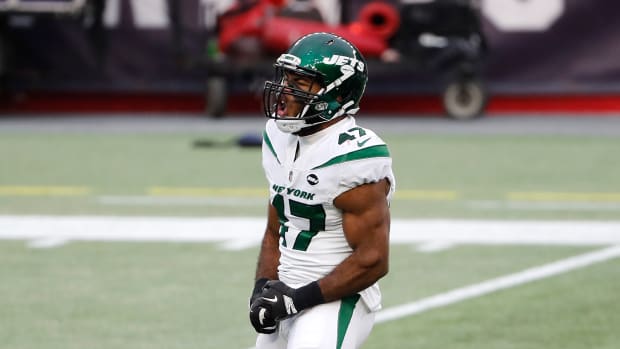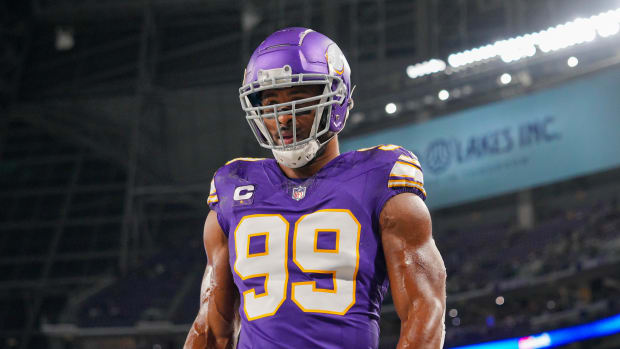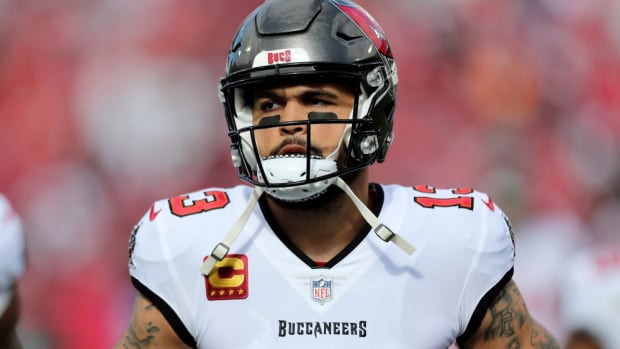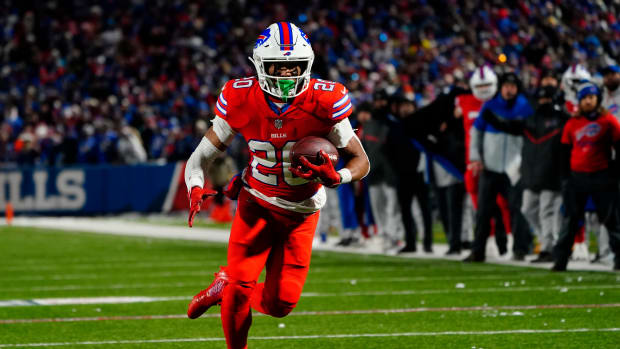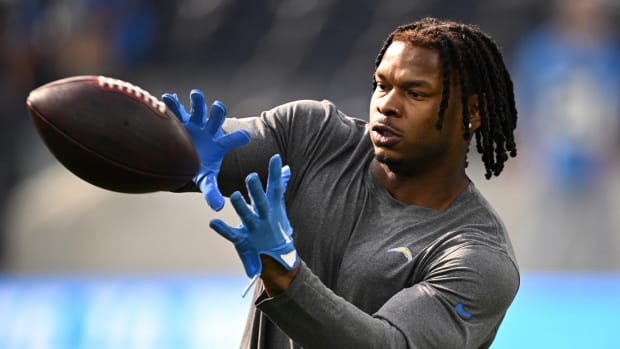Kyle Turley, In His Own Words: On country music, concussions and the future
Kyle Turley spent eight seasons in the NFL, earning First Team All-Pro honors in 2000. (Jamie Squire/Getty Images)
The first thing Kyle Turley will tell you is that he’s much busier now than he was when he played in the NFL. Married for 10 years and the father to two small children, the 1998 first-round pick of the New Orleans Saints played for his first team for five seasons, and was traded to the St. Louis Rams before the 2003 season. He played for the Rams for one season before back injuries took him out of football for two full seasons. He signed with the Kansas City Chiefs in June of 2006 and played there for two years, retiring following the 2007 season.
Of course, Turley is known primarily for one on-field incident -- when he pulled New York Jets safety Damien Robinson off of Saints quarterback Aaron Brooks while Robinson was pulling Brooks’ facemask as if he wanted to pop Brooks’ head clean off. Turley then threw Robinson’s helmet into the air and followed that up with an obscene gesture. His subsequent feuds with Rams head coach Mike Martz marked Turley as a man out of control.
As his football career was ending, Turley had other life paths in mind -- he formed a country music band that currently plays over 100 shows per year, and he’s been heavily involved in the Gridiron Greats foundation, which endeavors to help former players with difficult medical conditions related to their on-field injuries.
In a recent interview with SI, Turley started off by talking about his music, and the crowd-funding he’s currently using through a company called Indiegogo to promote his current single. But it didn’t take long for the discussion to turn to what ex-NFL players are dealing with, and that’s when things got interesting.
“I was approached to do it,” Turley said of the crowd-funding initiative. “I had a couple of friends who had done it -- [filmmaker] Sean Pamphilon for one, and a couple of friends in the surf industry. A friend brought it to my attention, and I saw it as a potential opportunity to continue to expand my reach into areas I hadn’t tapped into before.”
Of course, many will criticize Turley for the crowd-funding idea when he made so much money in the NFL. As you might expect, he’s got a ready answer for that.
“Most campaigns are to raise money for some person who doesn’t have it. Mine isn’t to raise money to sell my record, really -- I’m using it as a tool to promote the new record release. It’s a tool for that, and to raise money for my charity work. I have a number of charities I work with, and I try to give to all of them. The more money I can raise, the better, obviously.”
As passionate as Turley is about his music, he’s got a real fire in his belly about the ways in which the NFL has treated the men he calls “my brothers” over time.
“The general public doesn’t understand the true reality of professional football. The average NFL career is three-and-a-half years, and you need four years to be a vested player, eligible to receive benefits. Even players who are supposed to receive those benefits are having a lot of trouble with the system, which was notoriously set up to deny claims. They’ve made great strides now in the last few years to try and right the wrongs they’ve admitted to, and they’ve resolved some of the issues that have been put in place. ... But the majority of former players don’t receive benefits, and I don’t know a single person who walked away from professional football without vested status who didn’t have some sort of serious injury. Those injuries will bother them, and be a great hindrance to them and their families. We’re seeing the repercussions of that. Before, it was thought of as the joint issues, and arthritis, and all these other things. Now, we’re finding out more and more about concussions, and these are creating a myriad of different issues that are plaguing these guys down the road.
“We’re finding guys in really bad situations. There are players in dire need, and that doesn’t matter if you’re rich or poor -- it affects everybody. If you got all that money -- whether you put it with Lehman Brothers, or you snorted it up your nose or spent it on hookers -- so what? It is what it is. These are my brothers, and I intend to take care of them.”
Most of the players you talk to from previous eras will tell you that if the NFL had specific information about the long-term effects of concussions and hid it from players -- the general contention of current lawsuits that involve more than 4,000 ex-players -- they did a very good job. From players to coaches to trainers, concussions were not treated with any level of severity.
“I had escalating episodes of vertigo through my career that were pawned off as freak occurrences, every now and then. These were consistencies -- they were happening every season, and I had no idea where they were coming from. They would put me in a dark room, and tell me to lay down, and they’d wake me up after practice. I couldn’t stand up, everything was spinning, and I was vomiting profusely. It got to the point late in my career where it was happening more often, and after my career was over, almost daily. It put me in the hospital, and I was eventually able to track down where this was all coming from -- by getting to the right people, and with all the knowledge that’s starting to come out about concussions."
Eventually, Turley had to deal with seizures, and a rapidly deteriorating quality of life.
“These episodes of vertigo I had stemmed from concussions. There’s no doubt about that, because there were these certain circumstances, and I had no idea where they came from. But looking back, I can trace those incidents to every football season -- that’s when these things were occurring. It wasn’t during the offseason when these things were manifesting themselves to this degree until later in my career. By then, it was a consistent chain of events -- in and out of season. Those episodes of vertigo, the bipolar disorder I developed over a period of time that just became an unbelievable thing for me to deal with -- these were all elements that were combining into these episodes. Doctors I see now, specialists in the field, link it back to the many concussions I suffered.
“Now, I take medication. I don’t have the bipolar disorder, and I haven’t had the vertigo since I got on the medication three years ago. I still deal with depression and anxiety, but it’s not even close to where it was going before. Now, I at least know what’s going on, and I can deal with it a lot better. The medication keeps me from going over the edge, and helps me acknowledge what’s going on. Before, it was a speeding train, falling off the tracks.
“It was unbelievably scary for me and for my family.”
Some fans would prefer to believe that the concussion discussion is much ado about nothing -- after all, they’ll say, these guys knew what they signed up for when they signed up for it. Turley faces an additional hurdle in that he’s perceived by some as a loose cannon whose opinions should not be taken seriously. Turley is all too aware of this, but at this point in his life, he doesn’t seem to care.
“I don’t know if there are any 'misperceptions' about me. Those who see me without knowing me? That is who I am. To know me is to understand that there is a completely different side to that person. My football mentality was what it was, because that’s where I felt I needed to be mentally to play the game. In situations like the helmet-throwing incident, or the issues with Mike Martz -- those are two separate ones, but they’re relative in that they’re fight-or-flight situations. I’m being confronted by a bully, and I don’t work well with bullies.”
Part of what drove him back then, Turley says, was an awareness that when you stepped on the field, you had to operate with a certain frame of mind. When we spoke, I compared it to something Pete Townshend of The Who said about going on stage, and how he had to flip a switch and become a completely different person to do what was expected of him. Turley readily agreed.
“The NFL is the best of the best. If you play with questions or doubt in your mind, you’re going to get hurt, or you’re going to hurt somebody else. The nature of the game -- you have to take it on, and become that other person. You step across the line, and you flip that switch. A lot of coaches say that you can’t flip that switch, you have to work hard at it, blah, blah, blah. That’s the biggest lie in the world. My on-field persona wasn’t going to spill over into my off-field persona, because God help the public -- I would have been in prison multiple times, like some of these guys have been.”
The only thing that gets Turley really hot these days is the NFL’s response to the concussion issue. The league didn’t really change its stance on the subject until commissioner Roger Goodell was excoriated in a 2009 Congressional hearing in which he was evasive when answering questions about the link between head trauma and cognitive disorders. While the league has endeavored to at least look like it’s doing something to solve the problem, some team owners aren’t totally on board with the PR battle. Recently, Cincinnati Bengals owner Mike Brown said that any link between football-related head trauma and cognitive issues later in life is “mere speculation.” As one might expect, Turley was ready to throw Brown’s figurative helmet into the air.
“I am part of the concussion lawsuit. Is Mike Brown a doctor? He must really know what he’s doing, with all those great teams Cincinnati’s had over the years. I sat next to the NFL’s doctor, Dr. Ira Casson, at a Congressional hearing in Detroit, and listened to this man say the exact same thing: That there is no link between … not only that, but that there cannot be a link between football and any of these things that we’re talking about.
. When you’ve got a nine-times rate [nine times more likely] of acquiring one of these horrific diseases than the general public has? I would dare say there’s a link to the sport of football. That’s just me, but I don’t need people to go off of just me. People just need to go off of the doctors who are researching this, and spearheading the stories. They are showing and proving that this happens."
Studies revealed that Junior Seau suffered from a degenerative brain disease likely caused by repeated head trauma. (John W. McDonough/SI)
When NFL legend Junior Seau committed suicide in May 2012, people immediately started to link the circumstances of his death to CTE (Chronic traumatic encephalopathy), a degenerative brain disease which has been most commonly found in athletes who have suffered repeated head trauma. The subsequent battle for Seau’s brain turned into a soap opera. An expose by Steve Fainaru & Mark Fainaru-Wada that aired on ESPN’s Outside the Lines program revealed “a scientific backroom brawl in which the NFL prevailed over a half-dozen researchers vying for Seau's brain.”Eventually, it was revealed that Seau did suffer from CTE.
As Turley told me, it wasn’t pretty at all.
“You saw what happened with Junior -- the response of making the doctors look bad because they were trying to get his brain so quickly. ... They delayed that process. Dr. Bennet Omalu sat ready to examine the brain, ready to gain knowledge from it, and he was railroaded by the NFL, and the Chargers’ Dr. Chao. They unbelievably used Junior’s son to do this, and manipulated him so that they could own Junior’s brain and put it with the NIH [the NFL-subsidized National Institutes of Health], which had no databank of the brains of football players. Not like these other doctors, Omalu and Cantu have.
“What the NIH failed to mention in the ESPN piece that ran on the anniversary of Junior’s death is that immediately after Junior’s brain went to the NIH, the NIH came out with a statement saying that Junior’s brain didn’t show signs of CTE. As the demand furthered for the pictures to be shown, the NIH realized that it couldn’t run from this any longer. They then came out and said, ‘OK, his brain did have CTE.’
“It needs to stop. Mike Brown? I dare say, he’s not a neuro-anything, and he needs to keep his fat mouth shut while he’s making millions of dollars, and his players are suffering from Alzheimer’s and dementia. If there’s no connection between the two, as Mike Brown says, why did the NFL recently put out a neuro-cognitive benefit for players to receive if they sign a waiver which says, ‘You will not sue any NFL club if you take this benefit?’
I asked Turley what I’ve asked a lot of other former players: What does he want these lawsuits to accomplish?
“To solve these issues that have taken place. I have friends from my NFL days who have been in and out of mental institutions. There are people who need to be made whole, and the NFL needs to commit to a VA-style hospital so that NFL players can receive treatment for life, period. There’s no reason that NFL players shouldn’t receive lifetime medical benefits, because the injuries that happen on that field last for a lifetime. Whether the NFL wants to admit that or not, and whether someone might want to take advantage of that system or not, is beside the point. It’s the majority who are dealing with this. At Gridiron Greats, we’ve established relationships with medical facilities across the country that are giving our guys pro bono medical care. Hospitals are willing to donate their services because they want the relationship with the NFL, and it’s really sad that the NFL doesn’t see that. They could partner with a medical group and take care of all these guys, and all their injuries, and it probably wouldn’t cost them much more than advertising space.
“The union is at fault, too. They ignored this problem and went after as much money as possible, thinking that if players had more money, it would solve these problems. That’s the furthest thing from the truth, and statistics show it.
“I know that I would give up the millions I’ve made for a clear medical status.”
I then gave Turley a hypothetical: If his band was booked to play a Super Bowl halftime show, and he was afforded the opportunity to ask Roger Goodell one question, what would that question be?
“Why has the NFL not committed a qualified, independent neurologist to every sideline? He mentioned it at the Super Bowl as a possibility to happen this year, and it hasn’t been mentioned since. If they’re truly trying to change the game and make it safer … these rules they’re implementing are not going to do it. I know that as a player. Those guys have no clue. They’re not players, and they don’t understand. The things they’re doing are actually going to get more guys injured. Players are more aware of what concussions will do to them, so they’re making better personal decisions. But I’m sick and tired of guys being manipulated when they’re under duress when it comes to injuries. It happened to me, and when it happened to me, I realized … players are disposable, and it’s all about the next guy up.”
So now, for him, it’s about music, and life, and giving back. Turley told me that he’s not necessarily happier now that he’s out of football, but he’s a lot more settled in his mind. Thus, a guy who still looks like a roadie for a death metal band finds different ways to express himself.
“Well, at the gym, you want some Pantera, some Slayer, throw some old Metallica in there. But the country thing -- I have the country project, and I also have a heavy metal project that I do. I stay connected to both worlds, but I’m old now, man! I have a lot of injuries, so I’m all about sitting down and pickin’ the guitar. And those songs come out country. It’s three chords and the truth. It’s stories about my life -- who I am, where I’m from, where I’m trying to go. That’s what I love about the country music aspect. The metal aspect is another world -- it’s fantasy and letting it all out for me. It’s just like football -- saying those primal things that you want to get off your chest. You can pawn it off as needing to come up with ‘something evil,’ but there’s evil in us all, and it’s really therapeutic to get that out.
“I’m hoping to inject some power and some passion into country music. It may take a while for people to get into it, but once they take a listen, I think they’ll be hooked.”
Kyle Turley’s music is very much like the man -- deceptively complex, brutally honest and always compelling. He’s looking to make a different kind of impact now than he did as a football player, and the positive effects could be far more lasting. He’s still an outlaw, but he picks his battles with greater precision these days.


































